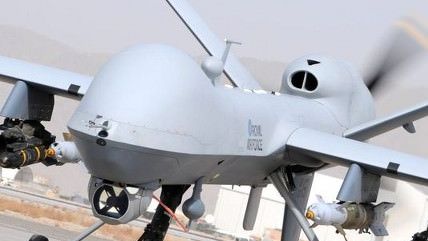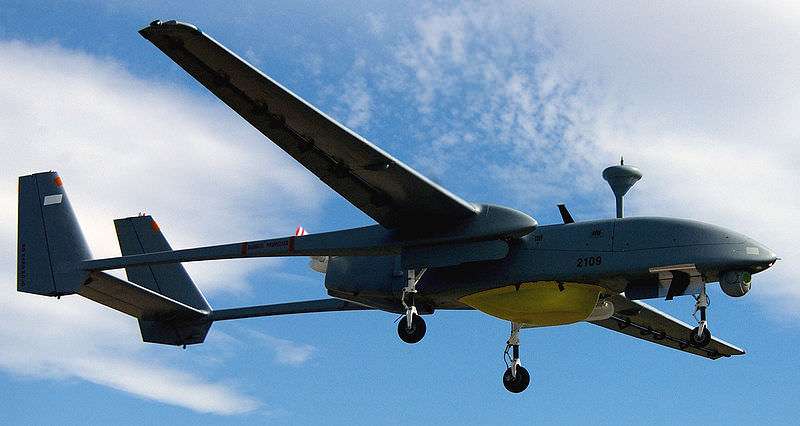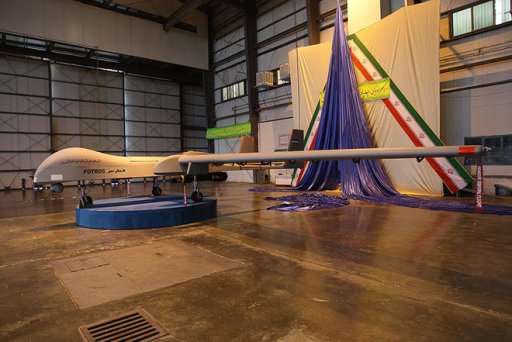Europeans Form "Drone Club," Looking To Compete With US, Israel

Two days before a suspected U.S. drone strike killed a senior member of the Taliban-linked Haqqani network in Pakistan, the Associated Press reported that France, Germany, Greece, Italy, the Netherlands, Poland, and Spain had formed what French Defense Minister Jean-Yves Le Drian has called a "club" to develop drones to rival American and Israeli UAVs.
From the AP:
Some Europeans fear they are falling behind in an area that may determine military aviation's future. Many aerospace experts believe the days of piloted fighter aircraft are numbered. In June, three major European defense contractors — pan-European EADS, Italy's Finmeccanica and France's Dassault — called for a concerted effort by Europe to catch up.
It is not surprising that officials in Europe want to compete with American and Israeli drones. UAVs are widely expected to be an increasingly common feature of future warfare, and Europeans will want to keep their militaries competitive with not only the American and Israeli militaries, but also the militaries of countries that have also been developing drones such as Iran and China.

Israel is the world's largest exporter of drones. One of the most popular, the Heron, a drone developed by a division of Israel Aerospace Industries, is used by militaries around the world, and has logged over 15,000 hours in Afghanistan.
As well as selling drones abroad, Israel has used UAVs to carry out targeted killings and conduct surveillance.
Likewise, the U.S. has used drones to carry out strikes against Taliban and Al Qaeda suspects abroad, which may constitute war crimes.

A few days ago, Iranian officials unveiled what Tehran says is Iran's biggest drone so far, the "Fotros," which reportedly has a range of 1,200 miles, meaning that it could reach Israel.
Last year, the Chinese unveiled the Wing Loong drone, which is capable of carrying missiles and looks a lot like the U.S. Predator drone. A recent report from the U.S.-China Economic and Security Review Commission notes that the similarity has led some analysts "to speculate Chinese espionage may have contributed to the Wing Loong's development," citing this article in a footnote.
For more from Reason.com on drones click here.
Editor's Note: As of February 29, 2024, commenting privileges on reason.com posts are limited to Reason Plus subscribers. Past commenters are grandfathered in for a temporary period. Subscribe here to preserve your ability to comment. Your Reason Plus subscription also gives you an ad-free version of reason.com, along with full access to the digital edition and archives of Reason magazine. We request that comments be civil and on-topic. We do not moderate or assume any responsibility for comments, which are owned by the readers who post them. Comments do not represent the views of reason.com or Reason Foundation. We reserve the right to delete any comment and ban commenters for any reason at any time. Comments may only be edited within 5 minutes of posting. Report abuses.
Please to post comments


Meh, European drones? They'll probably just be Etiquette and Protocol drones.
Will they speak Botchi?
Oh my God! Edward Norton was a drone the whole time!
What do they mean by "compete" with the US? Do they think that having their own fleets of flying killbots will dissuade the US from turning on them? Or do they just want a piece of that sweet "blowing up terrorist elementary schools in central Asia" action?
An Italian drone destroyed another fashion show in Paris today. "Those pieces were a crime only a terrorist could commit," officials from Milan claimed.
This was supposed to be a reply to Caleb.
I'm up there.
Maybe he is the Brooks School of Un-nested Commenting?
It's more of a personal philosophy than an outright "school."
A few days ago, Iranian officials unveiled what Tehran says is Iran's biggest drone so far, the "Fotros," which reportedly has a range of 1,200 miles, meaning that it could reach Israel.
I fully expect Kerry to condemn the existence of Iranian drones as a war crime. With a straight face.
How hard is it to believe the Chinese bought a Predator scale model kit and went from there?
Not very. Why re-invent the wheel?
Italy's Finmeccanica will be responsible for the Retreat Module, and Dassault for the Surrender Module.
Both Italy and France will be manufacturing the Switch Sides Module.
France will also produce, after any future war is over, the Resistance Module. It will be loud and obnoxious, its effects will be minimal to non-existent.
Britain will produce the Lose Valiantly Despite Grossly Outnumbering Enemy Module. A variant of this will be the Save Us! Module, followed by the Mk 1 America Didn't Do Shit Module.
So does that mean that Germany will be developing the Really Good Overengineered So Expensive We Can Only Afford A Handful But If We Had A Bunch Of These They Would Totally Turn The Tide Of The War model?
Yes. It will come in fifteen different variants none of which will have any parts commonality. Parts will be really small, intricate, and can be easily installed in a manner that will destroy the entire machine, and will be individually inspected and certified, twice.
Later versions will break if you look at them too hard.
I thought the French drone would just fly up to the opposing army and wave a white flag.
So where's Chuffy?
Will Jeeves be a valet to one of the Drones?
So what will American leaders do when Euro drone strikes kill a few hundred innocent American civilians along with a few dozen suspected terrorists on American dirt?
Europeans Form "Drone Club"
Once, people clubbed baby seals.